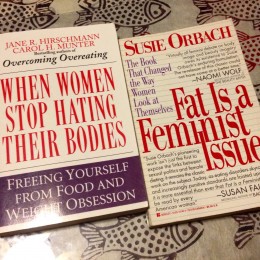When Women Stop Hating Their Bodies, The Office Picks Up The Slack

My therapist prescribes books
What a great time to be a woman in the workforce! You’re free to rise as high as you can, as long as you’re also cool with taking on additional feminine responsibilities pro bono — such as mentoring younger women, taking notes, and “bringing cupcakes” (??) — and also taking the terrible jobs no one else wants because you’re fat.
Let’s start with the fat thing, shall we?
“The data shows employers don’t want to hire heavier women to be the face of their company,” Shinall said. “But morbidly obese men don’t seem to be underrepresented in these personal-interaction jobs, nor do they seem to be over-represented in physical-activity jobs. That’s what’s striking about the data: We see a pattern for women but not for men,” Shinall said. “This is a sexual discrimination issue.” … The findings also cast obesity — at least among women — in new light, offering a collective image of overweight female workers not sitting idly for eight-hour shifts but toiling on their feet, lifting and constantly moving.
That work is typically not by choice, however, because such jobs tend to be among the lowest on the pay scale.
“I think what’s going on here is these physical-labor jobs are the only jobs that many morbidly obese women can get,” Shinall said. “Their options are more limited. Lots of times, these are the jobs that no one else wants.” She dubs the pay differential between plus-size women and average-size women: the “obese wage penalty.”
Yeah, okay, you say, but does the article link to the original study? Does it conflate correlation with causation? Are heavy women paid less because heavy women are more likely to be poor and of color, and did the study take that into account?
In order: Yes, and here it is. No, it doesn’t seem to. Yes, the study considered that, and, according to the official abstract, it doesn’t seem to be the case here:
Even after taking differences in education and socioeconomic status into account, there seems to be no scenario where being overweight becomes an advantage for a woman.
The convenient thing about obesity is that you can track it as a variable: a person can gain or lose a lot of weight and experience different treatment. Other factors — gender, class background, religion, sexuality — tend to be more fixed. Here’s a video about the study, if you’d like to know more.
Additionally, if you’re not yet full to sloshing with outrage, here’s a chaser to that shot, titled “Madam CEO, Get Me A Coffee.”
Women help more but benefit less from it. In keeping with deeply held gender stereotypes, we expect men to be ambitious and results-oriented, and women to be nurturing and communal. When a man offers to help, we shower him with praise and rewards. But when a woman helps, we feel less indebted. She’s communal, right? She wants to be a team player. The reverse is also true. When a woman declines to help a colleague, people like her less and her career suffers. But when a man says no, he faces no backlash. A man who doesn’t help is “busy”; a woman is “selfish.” …
In a study led by the New York University psychologist Madeline Heilman, participants evaluated the performance of a male or female employee who did or did not stay late to help colleagues prepare for an important meeting. For staying late and helping, a man was rated 14 percent more favorably than a woman. When both declined, a woman was rated 12 percent lower than a man. Over and over, after giving identical help, a man was significantly more likely to be recommended for promotions, important projects, raises and bonuses. A woman had to help just to get the same rating as a man who didn’t help.
Not long ago, a female senior executive we know was sitting at a board meeting next to several more junior male colleagues when the board chairman asked her to fetch him a soda.
The Harvard professor Rosabeth Moss Kanter observed that women do the lion’s share of “office housework” — administrative tasks that help but don’t pay off.
Ladies, to the barricades! Gentlemen, you’re free to come along in solidarity, but ask us to take notes at the revolution meeting at your peril.
Support The Billfold
The Billfold continues to exist thanks to support from our readers. Help us continue to do our work by making a monthly pledge on Patreon or a one-time-only contribution through PayPal.
Comments